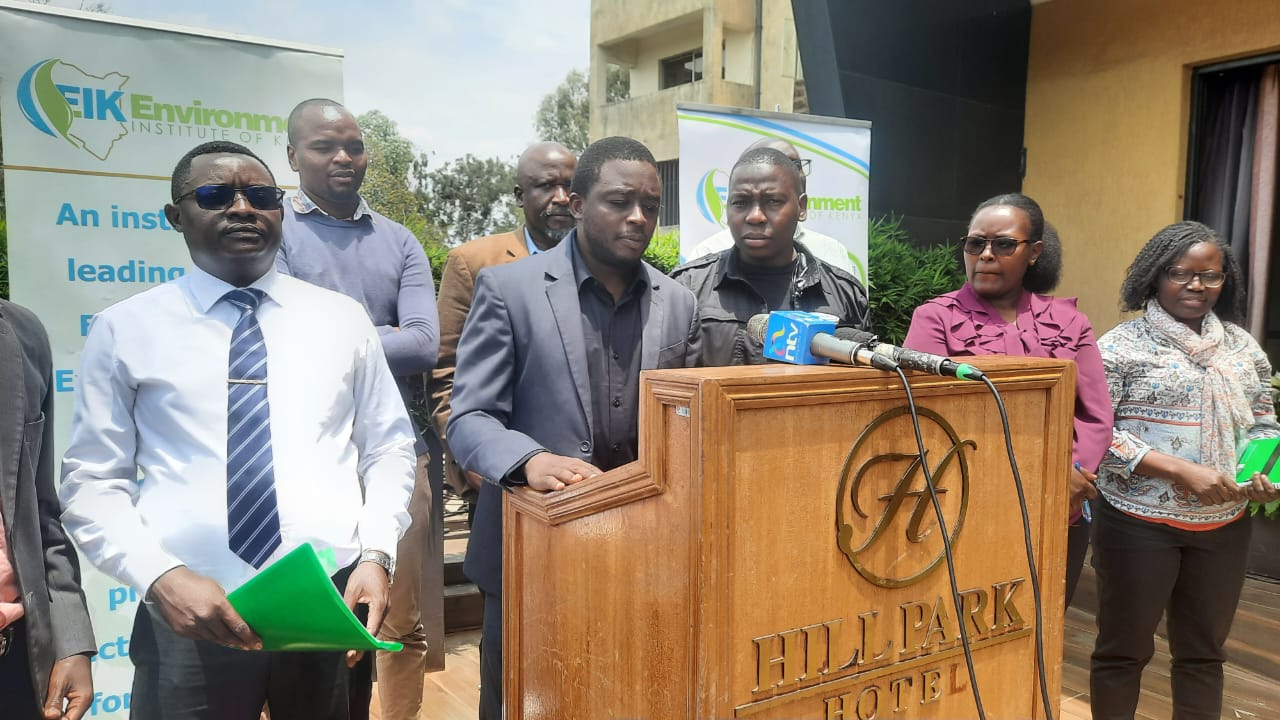
The Environment Institute of Kenya (EIK) environmental experts during a press briefing. Photo/Courtesy
By Daisy Okiring
The Environment Institute of Kenya (EIK) has strongly criticised the National Environment Management Authority (NEMA) over its rollout of the Environmental Information Management System (ENViS), warning that the unstable platform is crippling environmental licensing and threatening professional integrity.
According to EIK, thousands of environmental experts have been locked out of the platform since its launch in late July, leaving contracts stalled and project approvals stranded. At least 6,000 to 10,000 professionals are said to be unable to access the system, with permits such as Environmental Impact Assessment (EIA) licences, environmental audits, waste management approvals, and noise and air quality permits put on hold.
“This approach taken by NEMA has been illegal, procedurally flawed and rushed. The system is incomplete, untested and incapable of fulfilling its mandate, threatening national development and the credibility of professional practice,” said EIK Chairperson Alex Mugambi.
The institute has now demanded that NEMA revert to its old system while ENViS undergoes stabilisation, stressing that no structured transition or stakeholder involvement took place.
Chaos in licensing delays projects nationwide
EIK Vice Chair Edwin Otieno described the rollout as a crisis that has paralysed work for experts, contractors and developers. He explained that many professionals can no longer submit mandatory reports, obtain licences for their clients, or secure timely feedback from regulators.
“As an expert, I am unable to fulfil my contractual obligations. Developers seeking financing are now stranded, and professionals are receiving warning letters from frustrated clients,” he said.
The licensing disruption, EIK noted, is exposing entire sectors of the economy to risk. The delays affect agriculture, construction, energy, mining, tourism, manufacturing, public health, and civil society — all of which rely on functional environmental approvals to operate legally.
Read More: Who really benefits from Kenya’s carbon credit deals
Chief Executive Officer Titus Mutuku added that incomplete licences are another major flaw. In rare cases where ENViS generates permits, they sometimes omit key details such as the proponent’s name or project specifications, making them invalid.
EIK also disclosed that it had written several letters to the NEMA Director General, the Environment Cabinet Secretary and the Principal Secretary seeking dialogue, but none had been acknowledged. “Unfortunately, to date, we have not received any response,” Mutuku said.
Calls for structured transition and accountability
While NEMA maintains that ENViS and its accompanying Enterprise Resource Planning (ERP) system were intended to streamline compliance and improve efficiency, professionals argue that the rollout was rushed. They claim stakeholders were given only six hours’ notice before the platform went live.
“The urgency was unnecessary. There was no emergency and nothing was going wrong. This transition could have waited until everyone was prepared,” said Otieno.
Environmental experts insist the system has not been piloted or tested, raising questions about legality, procurement, and technical oversight. They argue that the current chaos risks slowing down investment and derailing national development targets.
Read More: Africa demands $50 billion yearly climate finance to avert crises
EIK has now called for solidarity among professionals, developers, civil society groups and citizens to demand transparency and accountability. “Together, we must demand legality, transparency, and functional systems that protect our environment, safeguard professional integrity, and support national development,” Mutuku said.
Experts are urging NEMA to reinstate the old system during the stabilisation phase and involve stakeholders in refining ENViS to align it with both legal and operational requirements.
Until then, hundreds of stalled projects and frustrated professionals highlight what critics describe as a clear example of poor governance in Kenya’s regulatory institutions.



